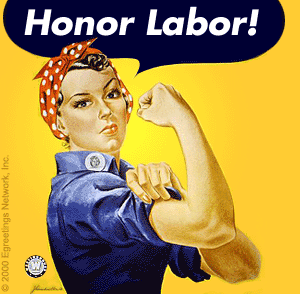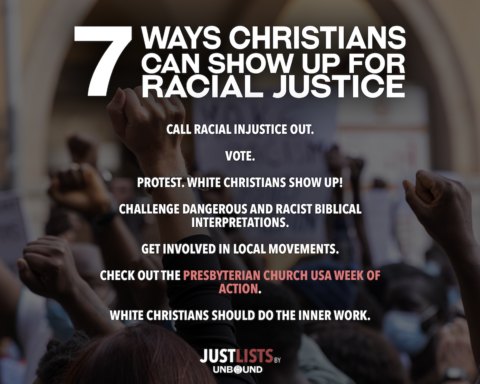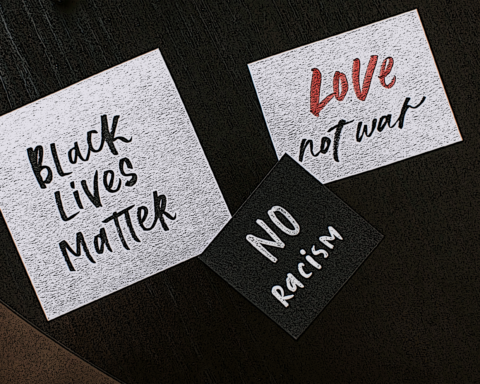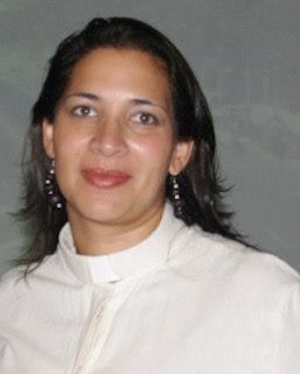
These days, when the business segment appears on a nightly news program or the radio, we often hear “good news.” The unemployment rate is down, and more companies are hiring. This is good news, right?
In many ways, not really. Yes, it’s good news that people are able to find jobs, but we need to ask, “What kind of jobs?” More than 24 percent of the newly-created jobs between December 2011and December 2012 are in the retail or leisure and hospitality industries. Many of these workers do not earn enough make a living.
In my work, I speak to many people, mostly religious people, about economic issues that impact our society, particularly issues that affect the low wageworkers in our communities. Without fail, everyone knows someone who is working in an hourly wage job, and usually, they are not earning enough to make a living.
But while many workers in our communities are struggling to pay their bills, the companies they work for are posting record profits, and CEO’s salaries are soaring. The U.S. has the largest income disparity of any developed country in the world. According to the American Federation of Labor, in 2012 the average compensation of a CEO was $12.25 million dollars, while the average compensation for a worker was $34,645. That’s a ratio of 354:1. Fortune 500 companies have a compensation ratio as big as 1795:1, according to Bloomberg News.
The pay ratio between the highest paid employee of the company and the lowest was only 20:1 in the 1950s. It rose to 42:1 in 1980 and to 120:1 by 2000, according to Bloomberg. The disparity continues to grow at an alarming rate. So, in the richest country in the world, average people cannot afford to feed their families, even if they work full time. The church needs to pay serious attention to income inequalities for hard working Americans.
Many of these companies are in the service sector. Bloomberg News highlighted the top 250 of the Fortune 500 companies that have the biggest gap between CEO and average worker pay. JC Penny tops this list with a ratio of 1795:1. CEO Roland Johnson made $59.9 million dollars in FY 2012, while the average worker at JC Penny only made $29,866. The rest of the list includes other companies you may be familiar with: Chipotle, Starbucks, Nike, Target, Wal-Mart, Abercrombie and Fitch, Macy’s and Ralph Lauren, to name a few.
The problem is not that there isn’t enough money to pay workers more; it’s that the CEOs are making too much.
 What’s worse is that two-thirds of all minimum wage workers are women, according to National Women’s Law Center. Couple that with the fact that women still only earn, on average, 77 cents to every dollar that men make. These are staggering facts.
What’s worse is that two-thirds of all minimum wage workers are women, according to National Women’s Law Center. Couple that with the fact that women still only earn, on average, 77 cents to every dollar that men make. These are staggering facts.
This past year, Interfaith Worker Justice worked closely with Hyatt Hotel workers, particularly with the hotel chain’s housekeepers, to raise awareness of health and safety issues at the hotel, especially related to women. Until Hyatt could come to an agreement on a contract with its workers around fair wages, benefits and safe working conditions, these workers called for a global boycott of the hotel.
As Courtney Hoekstra narrated in Monday’s post, the PC(USA) participated in the boycott! The church used its consumer power to send a message to Hyatt: the mistreatment of workers and poor wages do not reflect our values; therefore, as people of faith, we will reduce or end our business there.
Because of this seemingly small action, along with the actions of many other groups and individuals, on July 1, 2013, Hyatt Hotel reached a tentative agreement through which workers would see an increase in benefits by four percent each year.
These are no small decisions. And I am proud to say that the PC(USA) did the right thing and honored the boycott.
Unfortunately, we don’t always do the right thing. We’re not always willing to make costly sacrifices when we work for justice. And yet, it’s really only when we do things that cost us something, that we will see a change.
___________________________________________
Being a faithful advocate…will cost us something. And if it doesn’t cost us anything, we should seriously evaluate how we’re advocating.
___________________________________________
When the verdict came out that George Zimmerman was acquitted of all charges, I saw a flurry of posts on Facebook. One in particular caught my attention. The verdict came out late Saturday night, and some church folks were calling on everyone to wear a hoodie as an act of solidarity the next day, Sunday, at church. But if wearing a hoodie to church on Sunday doesn’t cost you more than disapproving looks from a few folks in your church, then you have not done enough. It’s the same way in every aspect of justice, particularly in economic justice. It’s not solidarity until it costs you something.
Being a faithful advocate is hard work, especially if we’re calling for higher wages and living standards for ALL people, not just the rich. It will cost us something. And if it doesn’t cost us anything, we should seriously evaluate how we’re advocating.
It is also crucial to make sure our advocacy is directed at the right people. Do the people with whom we are speaking know who we are and why they ought to listen? In relation to low-wage worker issues, part of the answer is easy. As customers (or potential customers), we can have a strong influence on companies. This is why speaking up about injustices and bad employment practices directly to store managers and heads of companies is important. They don’t want their public image tainted. When we express concerns about worker conditions and the company’s ethics, employers and managers pay attention. That is what happened with the Hyatt Boycott.
We are called to make choices everyday that have the potential to create a world where low-wage workers are no longer “low-wage workers” but rather workers who serve in a sector of our society that is essential and are compensated humanely for the services they provide. Even more so, we are called to listen to stories of those who are affected.
“So you say you love the poor? Name them,” asks Gustavo Gutierrez, a Catholic priest from Peru. How many people do you know who are directly marginalized or oppressed by the issue for which you passionately advocate? If the answer is none, it’s time to stop talking and start listening. Build relationships with people who are impacted. Listen as they speak from their hearts, and let their stories break yours. This practice of listening will lead us to action far more quickly and effectively than facts and figures from an article about income disparities ever will.
 When we listen to what the workers desire for a better work and better life, we are able to be better advocates.
When we listen to what the workers desire for a better work and better life, we are able to be better advocates.
So we can make a difference, beyond being conscientious consumers, because we listen and are willing to pay a different kind of price. We are a people of hope and people of mission. We advocate in the context of witness. God has called us in our baptism, taught us through our confessions, and nourished us through partaking in the Lord’s Supper, to seek justice and share the gospel of hope in Jesus Christ. Using our consumer power to speak truth to power in our world is an explicit way to be a bearer of the Good News.
In his State of the Union address in January 2012, President Obama said, “In the richest country in the world, no one working full time should live in poverty.” I believe President Obama’s call for an increase the minimum wage is a prophetic message the Church must respond to and champion.
Our government ought to look out for the common good and regulate people’s natural sinful tendencies toward greed. It’s time for our government to push for a higher minimum wage, one that provides enough to live on. I’ll even dare to dream that workers who put in a hard day’s work can go home and enjoy a healthy meal with their loved ones, have a roof over their heads, and enjoy the many blessings of life. As Presbyterians, we believe Christ called us into this world to transform it. We’re called to advance shalom in the world. Working towards more equity in pay is one of many steps towards shalom.
____________________________________________________________________________________________
AUTHOR BIO: Sung Yeon Choi-Morrow, Director of Organizing with Interfaith Worker Justice, studied Political Science and Urban Studies at Wheaton College and earned an M.Div from McCormick Theological Seminary. She is a deacon at Edgewater Presbyterian Church in Chicago. Before IWJ, Sung Yeon worked as a Community Organizer at the Asian American Institute, where she focused on immigration reform, the state budget, redistricting and voting.Read more articles in this series.






Unbound Social